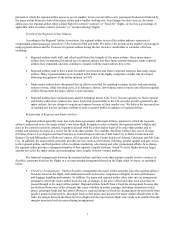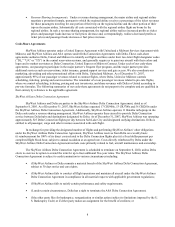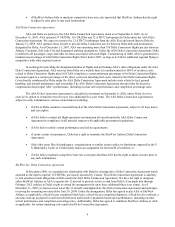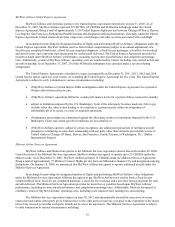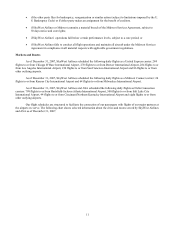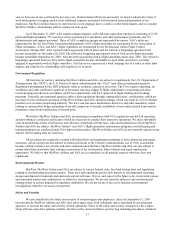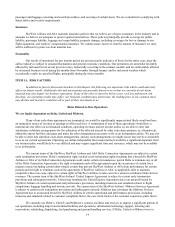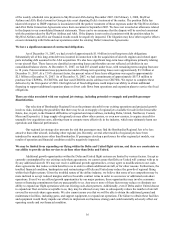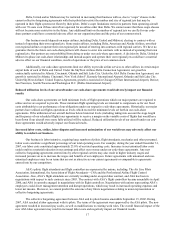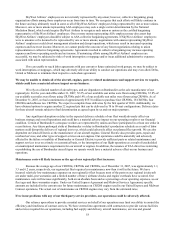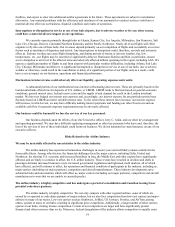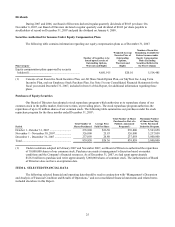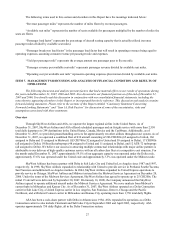SkyWest Airlines 2007 Annual Report Download - page 18
Download and view the complete annual report
Please find page 18 of the 2007 SkyWest Airlines annual report below. You can navigate through the pages in the report by either clicking on the pages listed below, or by using the keyword search tool below to find specific information within the annual report.17
Delta, United and/or Midwest may be restricted in increasing their business with us, due to “scope” clauses in the
current collective bargaining agreements with their pilots that restrict the number and size of regional jets that may be
operated in their flight systems not flown by their pilots. Delta’ s scope limitations restrict its partners from operating aircraft
with over 70 seats even if those aircraft are operated for an airline other than Delta. We cannot assure that these scope clauses
will not become more restrictive in the future. Any additional limit on the number of regional jets we can fly for our code-
share partners could have a material adverse effect on our expansion plans and the price of our common stock.
Our business model depends on major airlines, including Delta, United and Midwest, electing to contract with us
instead of operating their own regional jets. Some major airlines, including Delta, American and Alaska Airlines, own their
own regional airlines or operate their own regional jets instead of entering into contracts with regional carriers. We have no
guarantee that in the future our code-share partners will choose to enter into contracts with us instead of operating their own
regional jets. Our partners are not prohibited from doing so under our code-share agreements. A decision by Delta, United or
Midwest to phase out code-share relationships and instead acquire and operate their own regional jets could have a material
adverse effect on our financial condition, results of operations or the price of our common stock.
Additionally, our code-share agreements limit our ability to provide airline services to other airlines in certain major
airport hubs of each of Delta and United. Under the SkyWest Airlines Delta Connection Agreement, our growth is
contractually restricted in Atlanta, Cincinnati, Orlando and Salt Lake City. Under the ASA Delta Connection Agreement, our
growth is restricted in Atlanta, Cincinnati, New York (John F. Kennedy International Airport), Orlando and Salt Lake City.
Under SkyWest Airlines’ United Express Agreement, growth is restricted in Chicago (O’ Hare International Airport), Denver,
San Francisco, Seattle/Tacoma and Washington D.C. (Dulles International Airport).
Reduced utilization levels of our aircraft under our code-share agreements would adversely impact our financial
results.
Our code-share agreements set forth minimum levels of flight operations which our major partners are required to
utilize and we are required to provide. These minimum flight operating levels are intended to compensate us for our fixed
costs attributable to our performance of our obligations under our respective code-share agreements. Historically, our major
partners have utilized our flights operations at levels which exceed the minimum levels set forth in our code-share
agreements. If the utilization of our aircraft declines below historical levels (including taking into account the stage length
and frequency of our scheduled flights) our opportunity to receive a margin on the variable costs of flights that would have
been flown if our aircraft were more fully utilized will be reduced. Reduced utilization levels of our aircraft under our cod-
share agreements would adversely impact our financial results.
Increased labor costs, strikes, labor disputes and increased unionization of our workforces may adversely affect our
ability to conduct our business.
Our business is labor intensive, requiring large numbers of pilots, flight attendants, mechanics and other personnel.
Labor costs constitute a significant percentage of our total operating costs. For example, during the year ended December 31,
2007, our labor costs constituted approximately 23.0% of our total operating costs. Increases in our unionized labor costs
could result in a material reduction in our earnings and affect our revenue under our code-share agreements. Any new
collective bargaining agreements entered into by other regional carriers may also result in higher industry wages and
increased pressure on us to increase the wages and benefits of our employees. Future agreements with unionized and non-
unionized employees may be on terms that are not as attractive as our current agreements or comparable to agreements
entered into by our competitors.
ASA’ s pilots, flight attendants and flight controllers are represented by unions, including: The Air Line Pilots
Association, International, the Association of Flight Attendants—CNA and the Professional Airline Flight Control
Association. Also, ASA’ s flight attendants are currently working under an open labor contract, and ASA has been in
negotiations with respect to such contracts since 2003. The contract with ASA’ s flight controllers became amendable in April
2006, and ASA is currently engaged in negotiations with its flight controllers. Negotiations with unions representing ASA’ s
employees could divert management attention and disrupt operations, which may result in increased operating expenses and
lower net income. Moreover, we cannot predict the outcome of any future negotiations relating to union representation or
collective bargaining agreements.
The collective bargaining agreement between ASA and its pilots became amendable September 15, 2002. During
2007, ASA reached a labor agreement with its pilots. The terms of the agreement were approved by the ASA pilots. The new
agreement resulted in increased pay scales, as well as modifications to existing work rules. The overall financial impact of the
new ASA labor agreement may result in increased labor costs and negatively impact our financial results.


